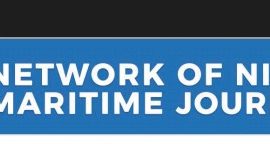
Freight Forwarders In Apapa Raise Alarm,Allege Fraud,Racketeering In ETO Call-Up System
![]()
Freight Forwarders In Apapa Raise Alarm,Allege Fraud,Racketeering In ETO Call-Up System
…..we have not increased our price-TTP
……,..says E-TAG, solution to current challenges
……..NPA debunks claims ,blames Agents,Truckers for issues in the port
……sets April 1st to enforce no plate number ,no entry into the port

Left co- Founder and Managing Director,TTP Limited Mr Jama Onwuabiariri,and Managing Director,Nigerian Ports Authority,Dr Abubakar Dantsoho
By Frank Odinukaeze
Freight forwarders operating under the Apapa Chapter of the National Association of Government Approved Freight Forwarders (NAGAFF) have voiced their frustrations over the controversial ETO Call-Up System, describing it as a “trap” that has led to widespread corruption and inefficiencies in port operations.

Prince EZe Uchendu,Chairman Apapa,Chapter ,National Association of Government Approved Freight Forwarders NAGAFF
Prince Eze Uchendu, Chairman of the Apapa Chapter of NAGAFF, highlighted the systemic issues plaguing the ETO system, which was initially designed to streamline the movement of container-laden trucks into ports. According to Uchendu, the system has been hijacked by cartels, leading to inflated costs and delays that burden freight forwarders and importers alike.
Uchendu criticized the Nigerian Ports Authority (NPA) for handing over control of the ETO system to truckers, a move he claims violates the ethics of the freight forwarding profession. He emphasized that ETO codes, which are critical clearing documents, should be managed by licensed freight forwarders, not transporters.
The chairman accused truckers of generating fake number plates to obtain ETO codes, which are then resold at exorbitant prices. While the official cost of an ETO code is ₦21,000, it is reportedly being sold for as much as ₦450,000, creating a lucrative racket.
The inflated costs of haulage, driven by the ETO system’s inefficiencies, have significantly increased the prices of goods in the market. Importers, aiming to maintain profitability, pass these additional costs onto consumers, further straining the Nigerian economy.
Uchendu proposed that the ETO system be integrated with the Terminal Delivery Order (TDO) process. By automating the generation of ETO codes and linking them directly to specific containers, the system could eliminate opportunities for fraud and ensure accountability.
Despite multiple meetings with stakeholders, including the NPA, Nigerian Shippers’ Council, and other regulatory bodies, Uchendu lamented the lack of action to address these issues. He accused the NPA of being complicit in the ongoing corruption, stating, “If they are not part of it, they would have done something.”
The freight forwarders have called for urgent government intervention to either reform the ETO system or abolish it entirely. They warn that failure to act will continue to enrich a few at the expense of the broader economy, leaving Nigerians to bear the brunt of inflated costs and inefficiencies.
Meanwhile ,a top Nigerian ports Authority source who wouldn’t want his name mentioned has refuted the claims by the freight forwarders.
In response to allegations of corruption and collusion with the Truck Transit Parks (TTP) and touts to exploit freight forwarders and customs agents, the source emphasized that the challenges facing port operations stem largely from the actions of freight forwarders and truckers themselves, rather than any inefficiency or malpractice on the part of the NPA or TTP.
The accusations have centered around the purchase of unauthorized “black market” Eto tickets, which some users claim are being sold at exorbitant prices, far above the official rates. The NPA source explained that such transactions are entirely avoidable if agents adhere to the established processes. “If there is no buyer, the seller will not sell,” the source stated, adding that those engaging in the black market are bypassing official procedures in an attempt to fast-track their operations.
The source further elaborated that freight forwarders who purchase these overpriced tickets often end up wasting their money, as their trucks are still required to follow the standard port protocols. The source cited examples of individuals paying up to 24 million Naira for services that should cost no more than 4 million Naira officially.
In addressing the broader challenges at the ports, the NPA source highlighted the problematic behavior of some freight agents and truckers. Issues include the illegal parking of containers within the port area, failure to promptly remove cleared containers, and the misuse of the port environment as a waiting zone for new jobs. These actions, according to the source , have significantly contributed to congestion and inefficiencies.
“Every day, the number of abandoned containers increases, creating serious bottlenecks on the limited 1.6-kilometer port road,” the source lamented. Our source also dismissed claims that the TTP or NPA directly instructed users to patronize the black market. Instead, they stressed that the onus lies on the agents to follow the proper application processes for Eto tickets, which take approximately one day to process.
The source acknowledged that no system is perfect and assured stakeholders that efforts are underway to address lapses and improve port operations. However, the agency reiterated its stance against illegality and urged agents to refrain from engaging in black market activities.
“The agents and truckers are the major problems in the port,” the source concluded, urging the media to report the facts objectively and hold all parties accountable for their actions.
In a move to address some of these challenges in the port ,our reliable source informed that from the 1st of April, 2025, all trucks entering the port must have the plate number of their truck clearly and firmly secured to their truck,stressing that the NPA would enforce “No plate Number ,No Entry” rule from the first of April.
Having been fingered by the freight forwarders in the alleged fraud and racketeering in the Eto Call up system,a conscious effort was made by Premium News Daily to reach Truck Transit Park TTP to get clarifications on the claims of the Agents. In an interview with Premier News Daily,the company that provides the technology for the ETO program,Truck Transit Park Limited, TTP,took time to explain how the ETO functions.Accordong to the TTP, the Eto call-up system, is a technological solution managed by Trucks Transit Park (TTP).
The Eto system, designed to streamline truck movement at Nigerian ports, was introduced as an electronic call-up solution to replace the outdated and chaotic paper-based system. Freight agents and importers are expected to book slots via the Eto mobile app or website for a standard fee. However, complaints from the industry indicate that some agents and truck owners are bypassing the official channels to purchase Eto codes at inflated prices.
In response, TTP’s Corporate Communications Manager, Nancy Nnamdi, and Operations Performance Manager, Adekunkle Ojo, clarified that the official price for Eto codes ranges between N10,000 and N20,000, depending on the truck category. They emphasized that the platform has maintained standard pricing and is not responsible for the skyrocketing prices reported by stakeholders.
TTP representatives also highlighted the recent adjustments made to create uniform pricing for flatbed trucks, which were previously priced differently depending on their routes. Despite these efforts, the growing involvement of third-party agents has led to complaints that freight forwarders are being charged much higher fees.
Both Nnamdi and Ojo acknowledged that while TTP has no direct control over third-party agents who exploit the system for profit, they have launched educational campaigns to encourage freight forwarders to use the official platforms. They stressed that engaging third-party agents often leads to inflated charges and added confusion, with many customers being misled into thinking the price hikes are due to changes in the Eto system itself.
A major concern raised during the interview was the alleged preferential treatment given to trucks that bypass the Eto system and purchase tickets through unauthorized channels. Freight forwarders who book through the official app reported delays at the ports, as some trucks that have secured tickets through agents are allowed faster access. TTP assured that efforts were underway to address these operational issues and ensure fair treatment for all users of the Eto system.
Looking forward, TTP revealed plans to introduce an advanced security feature called ETAG technology, an RFID-based system designed to prevent the resale of Eto tickets. This technology would ensure that each truck’s identity is tied to the Eto system, eliminating the possibility of fraudulent ticket sales. However, the technology is still under review, and its implementation awaits approval from the Nigerian Port Authority (NPA) and other stakeholders.
While TTP continues to push for technological improvements, they have stressed that enforcement of illegal activities, such as touts selling Eto codes on the streets, lies beyond their control. The Lagos State government, NPA, and law enforcement agencies are primarily responsible for managing these issues.
As the Eto system evolves, TTP hopes that the introduction of ETAG technology will eventually eliminate the fraudulent practices that are currently undermining the system’s effectiveness and increasing costs for stakeholders.
it is generally believed that the immediate approval of the ETAG Technology by the government would be a great pancea to the growing challenges in the ETO Call up system
However, it remains to be seen how quickly these reforms will be implemented and whether they will bring an end to the ongoing issues in Nigeria’s freight industry.









